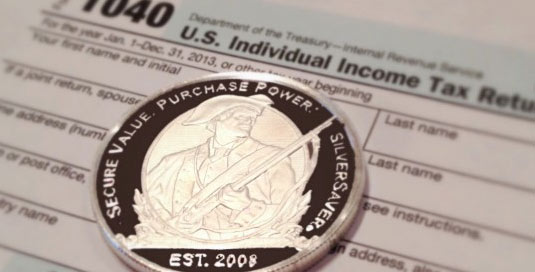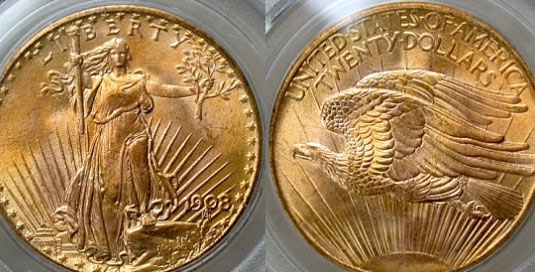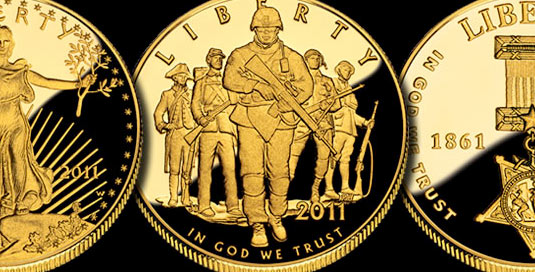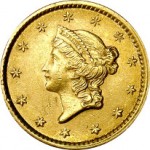Q: Do you have to pay taxes when you sell gold or silver coins?
A: Yes, gold and silver coins are taxed as a collectible by the IRS and you have to pay capital gains tax of 28% on the profit.
Yes, Virginia, There Is a Capital Gains Tax on Your Sale of Silver & Gold Coins
The IRS asks you to pay capital gains tax on any object or investment that is sold at a profit. That includes everything from a painting to a mutual fund to a shore house, and also includes collectibles like gold coins.
What Is the Capital Gains Tax on Selling Gold or Silver Coins or Bullion?
Gold coins are considered by the IRS to be collectibles, which are taxed at a higher rate than say, selling a stock that you’ve held long term. (The idea is that when you buy a stock you are boosting the economy, so they tax you at a lower rate; not so with collectibles)
Generally you will be taxed 28% on the profits made from the sale of your gold coins and gold bullion.
Here’s an example:
- Gold coins bought in 2007 for $1000 each ($5,000)
- Coins sold in 2016 for $1500 each ($6,000)
- 28% capital gains tax on $1000 profit = $280 in taxes
You May Also Have to File a 1099 Form When You Sell 25+ Ounces of Gold Coins
If you are thinking about what kind of gold coins to buy as an investment, note that not all gold coins are the same. You will have to file an additional form at tax time if you sell more than 25 ounces of the following gold coins:
- Canadian Gold Maple Leaf Coins (1 ounce)
- South African Krugerrands (1 ounce)
- Mexican Gold Onza Coins
You’ll also have to file that same 1099 form if you sell more than 32.15 ounces of any size gold bullion bars. (.999 fine gold) or more than 1000 ounces of silver bullion bars or rounds.
Gold Coin Sales Not Requiring a 1099
Gold coins that do not require the additional filing of a 1099 (you still have to pay capital gains on any profit after sale!) include:
- American Eagle Gold Coins
- American Gold Buffalo Coins
- Austrian Philharmonic Gold Coins
You do not have to file a 1099 with any quantity of the following silver bullion coins:
- American Silver Eagle Coins
- Canadian Maple Leaf Silver Coins
- Austrian Philharmonic Silver Coins
Because these gold coins and silver coins require less paperwork, they are often more popular among people who buy large quantities of gold bullion coins. Remember, filing the 1099 only applies to larger sales (over 25 ounces) of these coins. The sale of a few Krugerrands in a single tax year will not require the additional form.

I Was Given Silver or Gold Coins As a Gift, How Much Do I Owe In Taxes?
Upon selling the gifted coins, you will be taxed based on the price the gold coins were purchased for originally. If the coins were worth less than that amount when you received them, use the market value on the day they were given to you as your cost basis.
Keep Track of When You Bought Gold, and For How Much: Tax Implications
Because you have to pay taxes on the sale of gold coins and bullion, record the price that you paid as well as the date and seller information in your financial records. That is your cost basis, and you only are taxed on profits above that amount.
If you bought gold from a coin shop, consider keeping the original receipt stapled to a regular size piece of paper in your files.
If you bought a safe to hold the coins in, it may be possible to deduct the cost against your profit.

Saint Gaudens Double Eagles, Liberty Gold Coins, Buffalo Gold Coins, American Eagle Gold Coins, Silver Eagle Gold Coins: Bullion and Rare Coin Sales & Taxes
Regardless of the type of silver or gold coins, and whether rare numismatic coins or bullion coins, assume a 28% tax on capital gains when you sell them, as they are all classified as collectibles by the IRS unless advised otherwise by your accountant.
Gold & Silver Coins & Bullion Make The IRS Nervous
The subject of gold and silver has the potential to make uncle Sam a little nervous. Why? Because it’s a very private and powerful form of money; not easily tracked on a bank brokerage account, and not created (out of thin air?) by the Federal Reserve.
Did you know that from 1933-1974 it wasn’t even legal for citizens to own gold without a special license? As they say, “with great power comes great responsibility!”
Do Coin Dealers Report Gold / Silver Coin Sales?
Although most of the time coin dealers do not report gold / silver sales, you still want to do your homework before buying any specific investment so you aren’t surprised down the road.
So, I advise you to be smart with gold and silver sales, as not reporting capital gains is as serious as not reporting your income tax properly.
More:
- 7 Ways Not to Buy Gold: Kiplinger.com
- How to Buy Gold Coins as an Investment – zacks.com



Doesn’t seem right that a government can tax gold coins. I guess it will be my kids problem one day, because I’m not selling my gold or silver coins. They are the only “real” money I own, that can’t be mass-printed or created from “bytes” or “bits!”